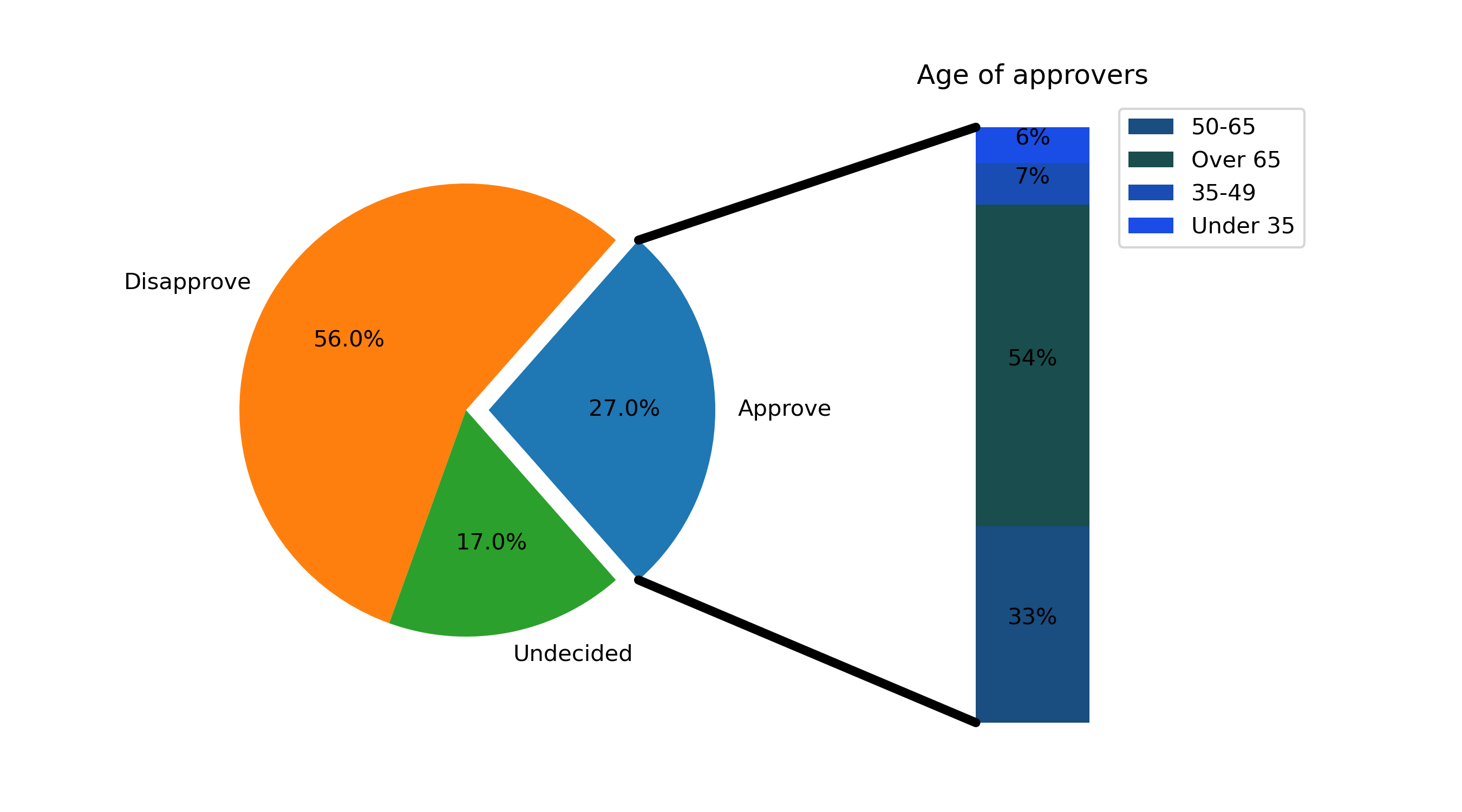>>> """
==========
Bar of pie
==========
Make a "bar of pie" chart where the first slice of the pie is
"exploded" into a bar chart with a further breakdown of said slice's
characteristics. The example demonstrates using a figure with multiple
sets of axes and using the axes patches list to add two ConnectionPatches
to link the subplot charts.
"""
...
... import matplotlib.pyplot as plt
... from matplotlib.patches import ConnectionPatch
... import numpy as np
...
... # make figure and assign axis objects
... fig, (ax1, ax2) = plt.subplots(1, 2, figsize=(9, 5))
... fig.subplots_adjust(wspace=0)
...
... # pie chart parameters
... ratios = [.27, .56, .17]
... labels = ['Approve', 'Disapprove', 'Undecided']
... explode = [0.1, 0, 0]
... # rotate so that first wedge is split by the x-axis
... angle = -180 * ratios[0]
... ax1.pie(ratios, autopct='%1.1f%%', startangle=angle,
... labels=labels, explode=explode)
...
... # bar chart parameters
...
... xpos = 0
... bottom = 0
... ratios = [.33, .54, .07, .06]
... width = .2
... colors = [[.1, .3, .5], [.1, .3, .3], [.1, .3, .7], [.1, .3, .9]]
...
... for j in range(len(ratios)):
... height = ratios[j]
... ax2.bar(xpos, height, width, bottom=bottom, color=colors[j])
... ypos = bottom + ax2.patches[j].get_height() / 2
... bottom += height
... ax2.text(xpos, ypos, "%d%%" % (ax2.patches[j].get_height() * 100),
... ha='center')
...
... ax2.set_title('Age of approvers')
... ax2.legend(('50-65', 'Over 65', '35-49', 'Under 35'))
... ax2.axis('off')
... ax2.set_xlim(- 2.5 * width, 2.5 * width)
...
... # use ConnectionPatch to draw lines between the two plots
... # get the wedge data
... theta1, theta2 = ax1.patches[0].theta1, ax1.patches[0].theta2
... center, r = ax1.patches[0].center, ax1.patches[0].r
... bar_height = sum([item.get_height() for item in ax2.patches])
...
... # draw top connecting line
... x = r * np.cos(np.pi / 180 * theta2) + center[0]
... y = r * np.sin(np.pi / 180 * theta2) + center[1]
... con = ConnectionPatch(xyA=(-width / 2, bar_height), coordsA=ax2.transData,
... xyB=(x, y), coordsB=ax1.transData)
... con.set_color([0, 0, 0])
... con.set_linewidth(4)
... ax2.add_artist(con)
...
... # draw bottom connecting line
... x = r * np.cos(np.pi / 180 * theta1) + center[0]
... y = r * np.sin(np.pi / 180 * theta1) + center[1]
... con = ConnectionPatch(xyA=(-width / 2, 0), coordsA=ax2.transData,
... xyB=(x, y), coordsB=ax1.transData)
... con.set_color([0, 0, 0])
... ax2.add_artist(con)
... con.set_linewidth(4)
...
... plt.show()
...
... #############################################################################
... #
... # .. admonition:: References
... #
... # The use of the following functions, methods, classes and modules is shown
... # in this example:
... #
... # - `matplotlib.axes.Axes.bar` / `matplotlib.pyplot.bar`
... # - `matplotlib.axes.Axes.pie` / `matplotlib.pyplot.pie`
... # - `matplotlib.patches.ConnectionPatch`
...

